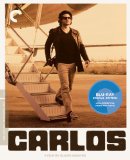| Reviews & Columns |
|
Reviews DVD TV on DVD Blu-ray 4K UHD International DVDs In Theaters Reviews by Studio Video Games Features Collector Series DVDs Easter Egg Database Interviews DVD Talk Radio Feature Articles Columns Anime Talk DVD Savant Horror DVDs The M.O.D. Squad Art House HD Talk Silent DVD
|
DVD Talk Forum |
|
|
| Resources |
|
DVD Price Search Customer Service #'s RCE Info Links |
|
Columns
|
|
|
Carlos
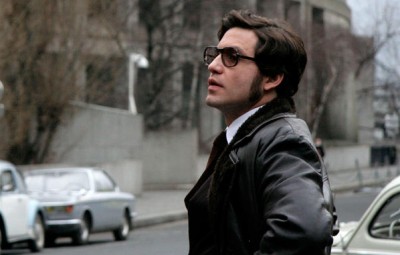
Please Note: The images used here are from promotional stills provided by Criterion, not from the Blu-ray edition under review.
It's fitting that, toward the end of Olivier Assayas's Carlos, the titular character (played by Edgar Ramirez)--once a notorious terrorist, but at this point in the film reduced to teaching guerrilla warfare to bored Sudanese trainees--cites the strategic philosophy of T.E. Lawrence, better known as Lawrence of Arabia. As much, if not more so, as David Lean's famous 1962 film on Lawrence, Carlos is a film epic; its three-part canvas, anchored by historical facts and the life events of an actual historical figure, is vast and fully covered by Assayas (Summer Hours--still his masterpiece). But the film is, in a significant way, the inverse of a Lean-style treatment. Rather than framing its subject with an eye to ultra-wide-shot, stately cinematic pageantry, Carlos insists on leanness, tautness, and immediacy; there is little languor, and Assayas remains tightly focused, staying on the timeline and faithfully playing out events with constant forward momentum throughout the film's globe-hopping, action-packed, drama-filled span; it feels quick, despite its unusual length. And it has an obsessive attentiveness to practicalities like strategy, logistics, and physical detail that may just make it the lengthiest--and the most gratifying--procedural in cinematic history.
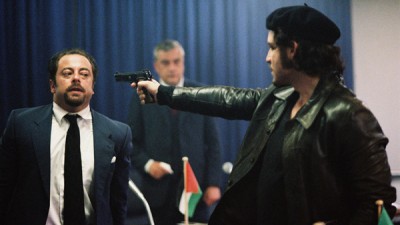
The procedures detailed over the course of the film are, at the scene-by-scene level, the plannings and executions of politically-motivated terrorist acts--bombings, hijackings, assassinations. But there is a cumulative, more macrocosmic dimension to Carlos that encompasses all these precisely played out political acts of violence as part of the larger procedure on which the film is such a clear-eyed work of quasi-reportage: that of Carlos's creation of a public image, his mastery of the logistics of becoming famous in an age of media saturation, political instability/revolutionary potential, and radical chic. There is an inbuilt tension between being a righteous Marxist revolutionary and radical egalitarian who at the same time seeks out and attains the kind of stardom only made possible by a consumer-capitalist culture, and it is that contradiction that Carlos--né Ilich Ramirez Sanchez, but "Carlos" is catchier--so fascinatingly embodies in his relentlessly driven, insatiably hungry rise and fall, which Assayas gives us with a maximum of observation and a minimum of psychoanalyzing exposition. This is in keeping with Carlos's personality. He was an acutely intelligent man when it came to history, politics, and ideology, but he was not insightful or self-reflective; his brash emphasis on action and movement and his avoidance of stasis and contemplation makes for a film in which we are always trying to keep up with the tireless activity of a figure operating on instincts he hasn't the time, patience, or inclination to delve more deeply into or try to understand.
The film's structure is thus bound at the beginning by the point in his young manhood when Carlos, living in London with his well-off, politically leftist family, becomes politically active; and at the end by the moment when his terroristic activism is permanently thwarted and ceased. We first encounter Carlos as an erudite, impassioned junior playboy, already a bad boy and a jet-setter in his early 20s, vehemently spouting revolutionary rhetoric. The young firebrand has arrived at the conclusion that talk and demonstrations are futile, and that the time for justified violence has now come, with the perfect opportunity to put that violence into practice having presented itself in the form of Israeli aggression against and oppression of Palestinians, along with the international political realignments arising from that troubling situation. In Beirut, Carlos approaches Wadie Haddad (Ahmad Kaabour), head of the militarized, radical pro-Palestinian terrorist organization PFLP (Popular Front for the Liberation of Palestine). Not entirely unlike the backstage lurker in All About Eve, he wants in; he "auditions" successfully for Haddad by carrying out several smaller-scale operations. But Carlos's ego and enjoyment of attention and the good life are always at odds with his role of soldier vis-à-vis Haddad's as commander, and after a checkered career with the PFLP that culminates in a brilliantly planned but ultimately failed invasion and hostage-taking at a high-profile meeting of OPEC's oil-rich nations--an operation that is the peak of Carlos's political activity, skyrocketing him to international renown, at the same time it is the film's dazzlingly orchestrated central set piece--he is forced out by Haddad, who admonishes him, "You have done a great deal for your own cause. You are famous now, a big star. Celebrities are never keen on obeying orders."
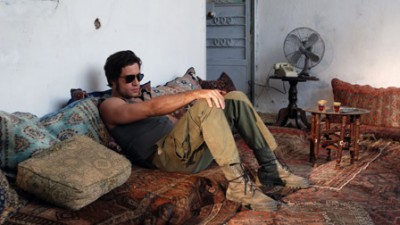
Carlos's ordeal with the politically failed but financially lucrative ($20 million ransom) OPEC hostage episode has opened his eyes to the uneasy but alluring relationship between revolution, terrorism, double-dealing, and money both for the cause and for anathema personal gain, as well as given him an addictive taste of media coverage, the publicity he had always in some way been seeking. In the wake of his expulsion from the PFLP, Carlos re-orients his activity from the Middle East to the Soviet bloc, using East German connections he made in the PFLP. He loses along the way the valuable but conflicted services of Hans-Joachim Klein (Christoph Bach), who has decided that violence is not compatible with his revolutionary ideals; but Carlos retains his working relationship with Johannes Weinrich (Alexander Scheer) and Weinrich's girlfriend, East German agent and aspiring revolutionary terrorist Magdalena Kopp (Nora von Waldstatten), whom he promptly steals from Weinrich, eventually marrying and having children with her.
The money and fame from the compromised but notorious OPEC raid prove a corrosive turning point; Carlos struggles to reconcile his former ideological passion and desperate need for publicly-acknowledged nobility and right action with his slow but inevitable slide toward dissipation amid his new constellation of mutually exclusive roles: increasingly mercenary, cynical international operative-for-hire, hobnobber in the hypocritically restricted socialite scenes of Communist nations, gourmand/womanizer, family man, revolutionary icon. Even this unsatisfactory but at least still active state of affairs becomes moot with the fall of the Berlin Wall in 1989. This time, political realignments serve as terminal blow rather than inspiration and opportunity; the "new world order" of the early 1990s leaves Carlos useless and out of the loop and, having been divorced by Magdalena after a frantic search for a country of asylum has led to one humiliating rejection after another, he finds himself washed up in Sudan, the only country willing to take him. He teaches, drinks, gets married again but continues to hire prostitutes, and generally becomes a marginalized, expatriate middle-aged man made vulnerable by his health problems until he is finally tracked down, extradited, and imprisoned by the French, ending his career--and the film.
Assayas and his gifted DPs, Yorick Le Saux and Denis Lenoir, have a laconic, steadily intense approach that makes the film redolent of the 1970s not only in its content but in its style, as well; not since Zodiac has a film been so directly inspired by the wonderfully patient, atmospherically intent "action"-thriller films of that era (The French Connection, The Conversation and, especially, the coolly captivating, naturalistic visual and lighting approaches of Pakula and Lumet). Perhaps Carlos's single most striking stylistic move is its slightly anachronistic, somewhat Marie Antoinette-like use of pop music on the soundtrack; somehow, the cold and formal post-punk of Wire or the sparse melodic elegance of early New Order make the perfect sonic accompaniment for the scenes in which they're used, despite not having been recorded until years after the periods being depicted. The film also marks the arrival of a Carlos-level star in the perfectly-cast Edgar Ramirez (The Bourne Ultimatum), who brings to his role a DeNiro-like physical/emotional commitment and a relaxed sensuality not seen since Javier Bardem singed the screen in Before Night Falls.
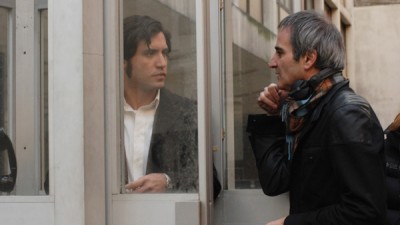
By the time Carlos comes to its abrupt but appropriate end, it feels as though we have truly experienced history through the film's spontaneous, immediate, second-by-second dramatization, a series of perfectly compressed and connected events whose overall scope and complexity are revealed only as the final credits come up and lead us to think back on the very long but unfailingly dynamic, fluid journey the film has just taken us on. The character of Carlos is self-romanticizing to the point that Assayas's camera is free not to gaze at him in admiration or condemnation, but instead runs alongside him, observing in motion every non-stop move of his increasingly unlikely attempts to outrun history and elude just the kind of clear-eyed, complicatedly nuanced, pointillist view of the failings and contradictions wrapped up with his charisma and passion to which the film that bears his name now subjects him. It is left for history to decode or judge as it will the enigmatic attraction and ambivalence of a puzzle like Carlos; in this case, history comes in the form of a movie audience.
THE BD:
Carlos's finely-honed visuals have been given the most conscientious, meticulous treatment possible; this AVC/MPEG-4, 1080p transfer (in anamorphic widescreen, aspect ratio 2.35:1) was supervised by DPs Yorick Le Saux and Denis Lenoir and approved by Assayas, and it certainly looks as though it has been rigorously held to the standards of people personally invested in its quality. The cool images stay cool, with grays, blues, browns, and greens weaving their sharp aura; the more warmly-lit scenes glow; and the blacks and shadows are all stable and solid, with zero instances of aliasing or other compression artifacts. This is a superb transfer.
Sound:The disc's DTS-HD Master Audio soundtrack is deep, full, and rich. The film's expansive sonic plenitude is beautifully re-created in scene after scene; the raucous music bursts forth propulsively; and all of it is as clean and smooth as could be, for a full aural environment with no distortion or imbalance whatsoever.
Extras:Given the well-deserved reputation that precedes any Criterion release, one is less surprised than pleased and impressed (once again) by how deep they have dug for the extras on Carlos, creating a universe of context and background (both cinematic and historical) in which to situate the film for better understanding and deeper appreciation.
--Carlos: Terrorist Without Borders, a 1997 episode of the French documentary TV series When History Burns (Les Brulures de l'histoire) directed by Patrick Rotman, is a fact-filled hour featuring copious interview footage with ex-classmates and associates of Carlos as well as government officials and experts on terrorism and guerrilla movements. Rotman obviously put the requisite effort and footwork into his research, and he keeps things relatively straightforward, objective, and informational, with only a few slightly jarring lapses into sensationalism.
--Maison de France, a 2003 feature-length film (shot on digital video) by German director Stefan Suchalla that recounts a Carlos-ordered, Johannes Weinrich-executed bombing from 1983--an event not depicted in Carlos--that tragically (and ironically) took the life of young peace activist Michael Haritz in Berlin. Suchalla traces Haritz's life and interviews his mother, sister, and cousin in the present day as Weinrich finally goes on trial, while also tracking down former colleagues, comrades, and acquaintances of Weinrich, as well as Carlos's ex-wife, Magdalena Kopp (a prominent character in the film). Though Assayas does not glamorize the violence in Carlos, Maison de France makes a healthily sad counterbalance and complement to the feature, restraining itself from any glamour whatsoever and simply reminding us quite effectively of the innocent lives stolen and shattered by the kind of violence Carlos endorsed as a legitimate revolutionary tactic.
--An interview with former Carlos associate Hans-Joachim Klein, conducted by journalist Daniel Leconte (Carlos's producer) and aired on French television in 1995. Klein, then still in hiding after becoming a sort of conscientious objector to Carlos's violence and leaving his gang to pursue more peaceful revolutionary paths, appears, eerily, in disguise, responding sometimes irritably to Leconte's questions, discussing Carlos (his assessment of his former comrade is absolutely withering), and giving a detailed rundown of the terrorist activities he participated in before thinking better of his involvement, descriptions that must have aided Assayas immensely when it came to constructing the analogous scenes in Carlos.
--"Olivier Assayas on the Making of Carlos", a 45-minute conversation in which the intense but unfailingly pleasant and good-humored director tells us pretty much anything we might want to know about the film and his experience of creating it. He runs the gamut from the serendipitous inception of Carlos to its equally fortuitous casting, from the film's style to his feeling of responsibility in portraying real history and murderous violence, relating along the way his personal memories of and connection to leftist politics in France in the 1970s. He also throws in some surprisingly juicy tidbits, like the fact that the film's bounty of soundtrack selections by great British post-punk act Wire was a second-choice replacement for tracks by the American group The Feelies, one of whose songs still remains prominent, but who were dubious of providing the soundtrack to the exploits of such a problematic figure. Perhaps the most relevant revelation for this particular Blu-ray release is how Assays always envisioned the film in 'Scope on the silver screen and shot it that way; he implies (discreetly) in this interview that he took the TV financing because it was an expedient way to get the running time and budget he needed. His benign conspiracy to create a big-screen work panned out quite well; though the film, like its TV/theatrical-hybrid predecessor Fanny and Alexander, was shown in a butchered "theatrical cut," the full version did make the big-screen rounds, and of course that is what we have here.
--A 20-minute interview with Edgar Ramirez in which the actor, given the role of a lifetime by Assayas and having acquitted himself nicely of the honor, discusses the process of working with the director and gives his own sharp, intelligent, objective take on the larger-than-life character he played, his psychology, and his peculiar place in history, referring to him as a celebrity-seeking "anti-Che."
--A 15-minute interview with director of photography Denis Lenoir, along with an additional extra featuring his commentary on six selected scenes. Lenoir, a frequent Assayas collaborator (he also shot Anton Corbijn's Control), describes some of the director's methods and approaches--his preference for keeping a composed frame even with a moving camera; his perhaps somewhat personally-driven approach to casting actresses and choreographing love scenes; his pride in the fact that nobody can distinguish his work in Carlos from that of the film's other DP, Yorick Le Saux--and goes into some technically minute but quite relevant and interesting detail on lenses and lighting in the selected-scenes commentaries.
--A 20-minute making-of, "Shooting the OPEC Sequence," that encompasses all the complicated aspects of shooting the film's beautifully pulled-off OPEC meeting raid scene. Anyone who loved the film and is curious about how it was made, or any aspiring filmmaker of any stripe, will benefit from witnessing how what looks so open and fluid onscreen is the result of some incredibly complicated, cramped, nitpicking, and painstaking work that makes Assayas's evident good humor and energy throughout what we see of the shooting here seem almost miraculous.
--The U.S. theatrical trailer (a serviceable but fairly lackluster promotional effort on the part of IFC; surely, this extraordinary film deserved a more creative and stylish preview).
--A 40-page booklet containing essays by Godard biographer/former BFI producer/all-around cinematic expert Colin MacCabe and cultural/historical expert Greil Marcus, as well as a detailed timeline of Carlos's exploits by historian Stephen Smith and selected mini-biographies of some of the supporting characters in the Carlos saga.
FINAL THOUGHTS:A thousand brilliantly conceived and ecstatically executed bits that connect and add up in the end to one of the most wide-ranging, complex, epic historically-contextualized life stories ever brought to the cinema, Olivier Assayas's Carlos is a film that achieves its glory pragmatically and progressively, through an admixture of narrative and stylistic inspiration and focus that transfixes us from the beginning and just keeps paying off as we follow the twisting, turning path of its dangerously charismatic, provocative central figure. Assayas is an important filmmaker whose aesthetic moves here may seem modest (they are never showy) from one individual scene to the next; but their precision and the graceful, quietly masterful way they are constructed and then structured together with such unforced connectedness mean that Carlos is more than the sum of its well-crafted parts, and a major entry in a filmography to whose strength, interest, and diversity it makes an indelible contribution that is unusually sizeable in both the literal and artistic senses of the word. Highly Recommended.
|
| Popular Reviews |
| Sponsored Links |
|
|
| Sponsored Links |
|
|
| Release List | Reviews | Shop | Newsletter | Forum | DVD Giveaways | Blu-Ray | Advertise |
|
Copyright 2024 DVDTalk.com All Rights Reserved. Legal Info, Privacy Policy, Terms of Use,
Manage Preferences,
Your Privacy Choices | |||||||









